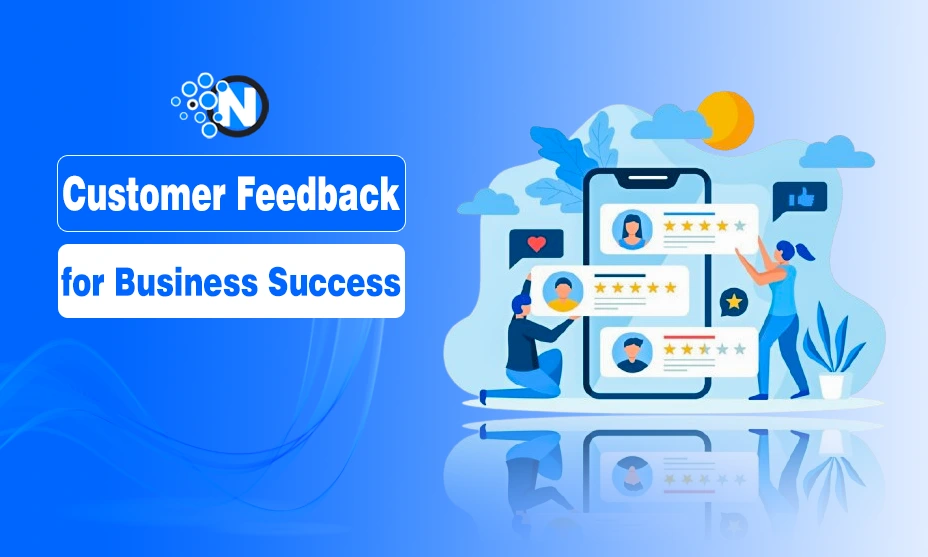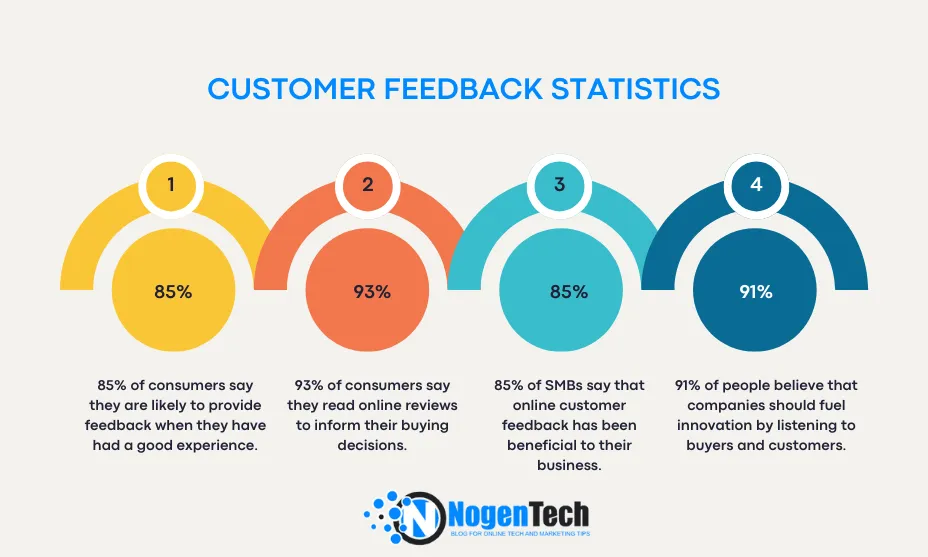Customer Feedback – Why It is Important for Business Success

In this competitive business landscape, understanding your customers’ needs and preferences is essential for achieving success. Customer feedback is vital in improving your business strategies, enhancing your products or services, and building strong customer relationships.
This article will help you understand the significance of customer feedback for business success and how it can contribute to business growth and prosperity.
Let’s start with a brief explanation and some interesting statistics!
What is Customer Feedback?
Customer feedback is the information and opinions provided by customers regarding their experiences with a company’s products or services. This feedback can be collected through different mediums, such as surveys, online reviews, social media interactions, and direct communication.

It serves as a vital tool for businesses, helping them understand customer satisfaction, identify areas for improvement, and make informed decisions. By actively seeking and responding to customer feedback, businesses can enhance their offerings, build stronger customer relationships, and ultimately achieve greater success.
Customer Feedback Statistics
Customer feedback helps in buying decisions for potential customers and enables businesses to improve their products or services to increase customer satisfaction. Below are some interesting customer feedback statistics you need to know:
- 85% of consumers say they are likely to provide feedback when they have had a good experience.
- 93% of consumers say they read online reviews to inform their buying decisions.
- 85% of SMBs say that online customer feedback has been beneficial to their business.
- 91% of people believe that companies should fuel innovation by listening to buyers and customers.

Importance of Customer Feedback for Business Success
Gaining Valuable Insights
Customer feedback is a great source of data on your target market. Actively seeking feedback from customers helps businesses understand consumer expectations, experiences, and problems.
Knowing what your customers need helps you properly modify your products to meet those needs. Rather than depending solely on assumptions, most companies also base their judgments on actual consumer experiences through customer reviews and feedback.
Enhancing Product Development
Paying close attention to your clients helps you to spot areas needing development and creativity. Usually, consumers offer helpful recommendations or highlight particular aspects they wish your good or service to have.
This input can form the basis for changing your offers, adding fresh features, or creating new goods fit for consumer needs. Including consumer comments actively into your process of product creation will help you to produce ideas appealing to your target market.
Improving Customer Satisfaction and Loyalty
Customers that feel acknowledged and appreciated grow to be brand ambassadors. By showing that customer pleasure comes first, soliciting and addressing consumer comments actively promotes a customer-centric attitude.
Dealing with issues and applying improvements based on comments helps raise customer loyalty and satisfaction levels. Happy customers are more likely to be devoted champions who share good word-of-mouth and generate returning business.
Identifying and Resolving Issues
Customer comments serve as a sort of early warning system for possible problems inside your company. Customer comments frequently point up flaws in a good or service, a bottleneck in a service, or a communication breakdown.
Quick resolution of these problems enhances the client experience and demonstrates your dedication to quality and customer service. Proactive feedback collection helps you to identify possible issues early on, so preventing their development and harmful effects on your company.
Building Trust and Credibility
With your target market, open interaction with consumer comments helps establish credibility and confidence. Consumers grow more confident in your brand when they see you respect their ideas and act upon them.
Establishing long-term connections and drawing in fresh business depends on this confidence. Positive client comments and testimonials can act as social evidence, impacting possible buyers’ decisions and so strengthening your market reputation.
7 Best Strategies for Customer Feedback Collection

1- Conducting Surveys and Questionnaires
Surveys and questionnaires are effective tools for collecting structured feedback from your customers. You can create surveys to collect specific information about their experiences, preferences, or suggestions.
However, to encourage maximum participation, the surveys should be concise, well-structured, and easy to understand. Offering incentives or rewards for completing the surveys can further boost response rates and encourage more detailed feedback.
2- Social Media Listening
Social media platforms provide an opportunity to tap into organic customer feedback. Monitor your brand mentions, comments, and direct messages to understand what customers are saying about your products or services.
Start conversations, address concerns, and show appreciation for positive feedback. By actively participating in social media discussions, you can build stronger connections with your customers and gain valuable insights.
3- Online Reviews and Ratings
Online reviews and rating platforms, such as Yelp, Google Reviews, or industry-specific review sites, are the best platforms for feedback collection. Monitor these platforms regularly and respond to both positive and negative reviews.
Acknowledge positive experiences and express gratitude. Proactively address and resolve issues highlighted in negative reviews. Engaging with online reviews shows your commitment to customer satisfaction and your responsiveness.
4- Customer Feedback Forms
Integrating customer feedback forms into your website or mobile app can facilitate the collection of direct feedback. These forms can be customized to capture specific information relevant to your business.
Ensure the feedback forms are user-friendly, easily accessible, and prominently placed within your digital platforms. Regularly review and analyze the feedback received to identify patterns and areas for improvement.
5- Encouraging Open Communication
Businesses must establish channels encouraging open customer communication to gather comprehensive and actionable feedback. This can include online surveys, feedback forms, social media engagement, and dedicated customer support channels.
By providing multiple avenues for feedback, businesses ensure that customers can easily voice their opinions and suggestions.
6- Incentivizing Feedback Participation
Motivating customers to provide feedback can significantly increase participation rates. Offering incentives, such as discounts, exclusive promotions, or rewards programs, encourages customers to take the time to share their thoughts. These incentives boost engagement and convey gratitude to customers for their valuable input.
7- Leveraging Technology for Efficient Feedback Management
These days, businesses can access several online tools and technologies that streamline feedback management. Feedback management platforms, emotion analysis tools, and data visualization software help companies collect, analyze, and extract actionable insights from large volumes of customer feedback.
These technologies enabled businesses to make data-driven decisions and track the effectiveness of their improvement initiatives.
Ending Note
Customer feedback provides valuable data that can change companies. Businesses can build better customer relationships, improve their products and get a competitive edge by actively listening to consumers, including their recommendations, and listening to their problems. Accepting client feedback as a strategic advantage helps companies to be long-term successful and expanding.




